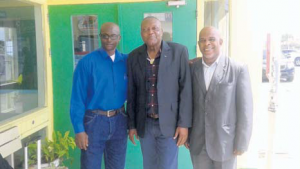A four-member Statia delegation will be meeting with the United Nations’ Decolonisation Committee this week in an effort to seek the support of international organisations such as the UN to intervene on the island’s behalf in the struggle with the Dutch Government for more autonomy and the right of self-determination.
Commissioner of Constitutional Affairs Reginald Zaandam was very clear as he was about to leave for New York on Saturday: The Netherlands, as Statia’s mother country has a responsibility and duty to work with St. Eustatius, and not to put up stumbling blocks and even boycott the public entity.
“The UN must be made aware of the fact that while the Netherlands made billions of euros available to Greece through the European Union, of which it is certain that 90 per cent or more will be written off, The Hague uses all sorts of petty reasons and excuses to substantiate as to why they cannot provide our people with the same living standard as those living in the Netherlands and why they cannot spend a couple of 100 million euros to eradicate the deprivation in the Caribbean part of the Kingdom,” Zaandam told The Daily Herald.
“We had sincerely hoped that the Netherlands would have assisted in finding ways to help the islands to foment economic growth. But I have come to believe that they rather keep us as beggars because that way they can freely execute their neo-colonial policies,” he said.
The Commissioner accused The Hague of treating the refugees better than the Statia residents. “Imagine refugees obtain the rights to the many (social) provisions available in the Netherlands, under the denominator humanitarian support, in comparison to our people that are kept to a bare minimum.”
He said it was “unacceptable” that refugees were being treated better than people with a Dutch passport living in the Caribbean part of the Kingdom. “One wonders if we should not opt for the refugee status.”
Referring to the history of St. Eustatius and its prosperous times in the 18th century, Zaandam said, “It is a bloody shame that The Hague neglects the obligation to credit St. Eustatius for a substantial part of the wealth they are enjoying now. After all, St. Eustatius was sacrificed in too many ways to mention in the Dutch interest.”
Zaandam said that he hoped to make the UN aware of the unbecoming practices of the Netherlands. “Hopefully this international organisation will see the unsupported and strong manipulated side of the Dutch in its behaviour where it comes to dealing with the decolonisation process.”

The Statia delegation, which besides Zaandam consists of Members of the Island Council Clyde van Putten (PLP) and Reuben Merkman (UPC), and advisor Xavier Blackman, will also table arguments to convince the UN Decolonisation Committee to place St. Eustatius back on the UN’s list of Non-Self- Governing Territories in accordance with Chapter XI of the UN Charter.
Zaandam explained that being on this list guaranteed that the island’s interests as occupant of the dependent territory St. Eustatius was paramount and required the Netherlands as a member state in control of the island, as a nonself- governing territory, to submit annual information reports concerning Statia’s development.
In so doing, an appeal upon the UN will be made to call the Netherlands to task regarding human rights, the fostering of social and economic development in St. Eustatius and to facilitate the decolonisation process without duress, the Commissioner added.
Noting that coming of age was generally a complex, hard process, Zaandam said that this phase, as part of the decolonisation process, besides being time consuming and challenging, required planning, understanding and especially commitment.
“There are enough examples in the world that portrays these struggles. Most of them are accompanied and accomplished by war and are laced with blood. People paying with their lives and blood for a better life in an accepted constitutional status. Often enough, it is the colonial mother country that does not want to let go and places hindrances just to be able to maintain their neocolonial agenda.”
According to Zaandam, history was testament to the fact that the first and most difficult step in the decolonisation process took commitment. “After this step, the point of no return is passed and there is no going back. The Hague knows that. The first martyr in this process was Mr. Ricardo Tjie-A-Loi.”
Subsequently St. Eustatius was confronted with an instruction to get its finances in order and to improve the quality of the public administration. “On top of that The Hague secretly put a boycott in place. In first instance, this boycott only related to visits of dignitaries. But the reality proved to be different. All channels to the Dutch ministries have been bogged down and we are compelled to do everything through the office of the Rijksvertegenwoordiger (Kingdom representative).”
But, Zaandam warned, “The Hague must know that the words giving up were not in the vocabulary of the current government coalition. Furthermore, we are giving them notice that we are shedding our cocoon of “wie betaalt, bepaalt” (whoever pays, determines the outcome). It is our island, so anything regarding us will be done with our integral input.”
Source: The Daily Herald.
 Archive of posts from Saba-News.com Archive Saba News
Archive of posts from Saba-News.com Archive Saba News